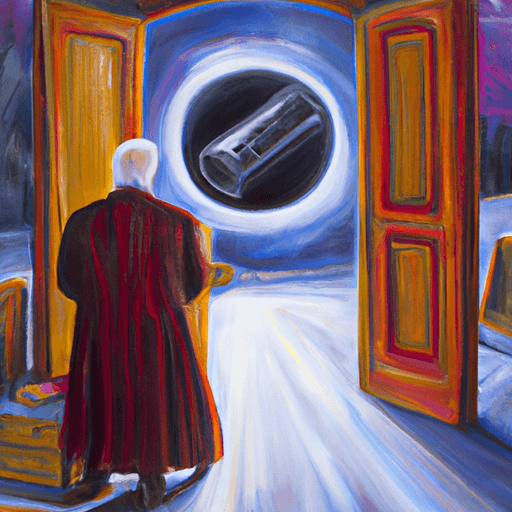autoBlog.
How much does Google really hate ChatGPT?
The philosophical exploration of technology and its implications has been ongoing since humans first developed tools and technology and continues to this day. It is an important part of the dialogue about the role of technology in our lives and the ethical implications of its use.
More Stories
Getting Started with Ontology: A Beginner's Guide
Ontology is an area of philosophy that deals with the nature of reality and how it can be known. It is the study of being and how different entities relate to each other.
The Dangers of Technological 'Progress'
Technological progress has been seen as a major source of societal advancement for centuries. It has helped to improve our lives in countless ways, from making it easier to communicate with each other to improving the efficiency and safety of everyday tasks.
Exploring the Roots of Philosophical Logic
Philosophical logic is a technical subfield of philosophy that focuses on the logical analysis of philosophical problems. It takes philosophical questions and applies logical principles to them in order to better understand and answer them.
Comparing Time Theories
The concept of time is one of the most mysterious and perplexing topics in philosophy. It has been studied and discussed by some of the greatest minds in history, and yet, it remains largely a mystery.
The Power of Argumentative Speech
Argumentative speech is a powerful tool in the world of philosophy. It is the practice of presenting an argument in an organized and logical manner.
Comparing Ontology Philosophies
Ontology is a branch of philosophy that deals with the nature of being, existence, and reality. It is an expansive, deep topic that has been studied and debated by some of the greatest thinkers of all time.
Exploring Skepticism: A Beginner's Guide
Skepticism is an ancient philosophical tradition that has been around for thousands of years. In its simplest form, it is the idea that we cannot be certain of anything.
Exploring Epicureanism: A History
Epicureanism is a philosophical tradition that dates back to the ancient Greek philosopher Epicurus. Epicurus was born in 341 B.
Exploring Kant's Logic Arguments
Immanuel Kant is one of the most influential philosophers of all time, and his work on logic has had an immense impact on the way philosophers and scientists approach problems today. In this blog post, we'll explore Kant's logic arguments and how they can be applied to modern problems.
Exploring Substance Metaphysics: A Beginner's Guide
Substance metaphysics is an important branch of philosophy that deals with the nature of reality and the relationship between objects in the world. It is a complex and often difficult topic, but it is also extremely interesting and rewarding to explore.
Exploring Ethical Decision-Making: A Beginner's Guide
Making ethical decisions can be a daunting process, especially for those who are just starting out. It's important to understand the various philosophical factors involved in ethical decision-making, as well as the implications of your choices.
The Eternal Grandfather: Exploring the Significance of the Time Machine Thought Experiment.
Time travel has fascinated humans for centuries, from ancient myths to contemporary works of science fiction. But what if time travel were possible?
Aristotle on Ontology: A Review
Aristotle's views on ontology are of particular importance to those studying philosophy. His views on being and its relationship to our perception of the world have been studied and debated for centuries.
Exploring Quantum Mechanics: Beginner's Guide
Quantum mechanics is one of the most fascinating, yet challenging branches of philosophy. It is the study of the behavior of matter and energy on a subatomic level, and it has been used to explain a wide range of phenomena, from the behavior of particles to the behavior of light.
Aesthetics Through History: Examining Its Development
Throughout the centuries, the study of aesthetics has evolved from its ancient roots to a fully developed field of philosophy. From Plato to Kant, aesthetic theories have shaped the way we view beauty and art.
Kant's Categorical Imperative: Exploring Its Bioethics Impact
Immanuel Kant's Categorical Imperative (CI) is a moral principle that has been widely explored and debated in the world of philosophy. It is a concept that has been used to evaluate ethical decisions in a wide range of areas, from personal relationships to business dealings.
Exploring Epistemology: A Beginner's Guide
Epistemology is a branch of philosophy which deals with the nature of knowledge. It is a complex and sometimes controversial subject, as it asks questions about the limits of human knowledge, the nature and acquisition of knowledge, and the validity of knowledge claims.
Ethics for Beginners: Exploring Morality
Ethics, or moral philosophy, is a branch of philosophy that seeks to understand and explain morality. It is a complex and multifaceted field that is often misunderstood and misrepresented.
Exploring Bioethics: A Beginner's Guide
Bioethics is a branch of philosophy that focuses on the ethical implications of medical treatments, research, and decisions. It is an important and complex field that is often misunderstood or overlooked.
Exploring the Evolution of Time Philosophy
Time is one of the most fundamental concepts of human experience. Philosophers have long been fascinated by the concept, attempting to define and understand it in various ways.
The Trolley Test: Examining Aesthetic Morality
The Trolley Test is a thought experiment first proposed by British philosopher Philippa Foot in 1967. It is a tool used to evaluate a person's moral judgments.
Science and Contradictory Views
The concept of contradictory views is a complex and technical topic in philosophy that has been debated and studied for centuries. It has implications for both science and the humanities, and is often a source of disagreement and confusion.
Kant's Categorical Imperative: A Critical Thought Experiment.
Immanuel Kant's Categorical Imperative is a fundamental principle of ethical philosophy. It states that an action is morally right if and only if it can be willed as a universal law.
The Impact of Platonic Realism on Mathematics.
Platonic realism is a philosophical view that suggests that abstract objects have a real and independent existence apart from the physical world. This view has had a significant impact on mathematics, especially in terms of its approach to truth, reasoning, and proof.
Modality & the Necessity of Possibility
The philosophical concept of modality examines the notion of possibility and necessity, and has been a topic of great debate among philosophers for centuries. It is a complex concept that involves exploring the various ways in which different possibilities can be realized and how certain possibilities are necessary for certain outcomes to occur.
Ontology Debate: Different Perspectives
The ontology debate is one of the longest standing and most contested topics in philosophy. It refers to the debate between realism and anti-realism in metaphysics, or the belief in the existence of a reality independent of our own.
Ludwig's Language Puzzle: Analyzing the Ineffability of Meaning
One of the most perplexing questions in philosophy is the concept of ineffability of meaning, also known as Ludwig's Language Puzzle. First formulated by philosopher Ludwig Wittgenstein, this philosophical puzzle deals with the issue of whether we can truly articulate the meaning of our words and thoughts.
Exploring Kant's Aesthetic Theory
Immanuel Kant's aesthetic theory is one of the most important contributions to the field of philosophy. His views on beauty, art, and the nature of experience have shaped much of the discourse surrounding aesthetics ever since.
The Paradox of Logic: Exploring The Trolley Problem
The Trolley Problem is a thought experiment in philosophy, which explores the moral and logical implications of making a difficult decision. The problem has been used to analyze many ethical theories, and it presents a paradoxical situation that is not easily solved.
The Power of Ontological Argumentation
Ontological argumentation has been used by philosophers for centuries. It is a form of argumentation that involves the use of logical reasoning to prove the existence of a higher power or God.
A Beginner's Guide to Ethical Decision Making
Making decisions ethically can be a daunting task, especially for those new to the philosophical field. It can be difficult to know where to start, and how to evaluate and weigh the different competing values and interests in a situation.
Metaphysics: Debating Perspectives
Metaphysics is one of the most debated topics in the field of philosophy. It deals with the fundamental nature of reality, the notion of being, and the relationship between the mind and the material world.
A Beginner's Guide to Metaphysical Reality.
Metaphysics is a branch of philosophy that attempts to answer fundamental questions about the nature of reality. It is often seen as the most abstract form of philosophy, and it is one of the oldest branches of philosophy, having been around since the time of ancient Greece.
Exploring the Limits of Ontology: Schrödinger's Cat.
Schrödinger's Cat is a thought experiment proposed by the Austrian physicist Erwin Schrödinger in 1935. It is designed to illustrate the problems of quantum mechanics and the limits of our understanding of ontology.
Epistemological Arguments: Analyzing Knowledge Claims
When we talk about knowledge, we’re talking about a lot more than just facts. Knowledge encompasses so much more - such as understanding, wisdom, and even insight.
Debating Aesthetic Philosophy: Critique.
Aesthetic philosophy is a widely debated topic that encompasses the appreciation of beauty in art, literature, and nature. It is also closely linked to the concept of an individual’s subjective interpretation of beauty.
Philosophical Implications of the 'Genie Experiment'
The 'Genie Experiment' is a hypothetical experiment based on the notion of free will. In other words, would you be able to make your own decisions and be the master of your own destiny?
Epistemology's Impact: Assessing Implications
Epistemology is the branch of philosophy concerned with knowledge and its sources, validity, and scope. This article will explore the implications of epistemology for our understanding of reality and how it affects our decisions and behavior.
Ontology: Contrasts & Comparisons
Ontology, a technical topic in philosophy, has been studied throughout history and is still a divisive subject among contemporary philosophical circles. In this blog, we will explore the contrasts and comparisons between ontology and its related topics, and consider the implications of these differences.
Tech Ethics Debate
Technology is rapidly changing the world in ways that are both beneficial and potentially dangerous. In particular, tech ethics has become a hot topic in philosophy, with scholars debating the ethical implications of technology and how to best use it in our lives.
Aesthetics & Philosophy: Implications Beyond
Aesthetic philosophy is a field of study that has grown increasingly popular in recent years. It is a broad field that encompasses both the physical and intangible aspects of art, and its implications go beyond the simple appreciation of beauty.
Descartes' Take on Philosophy of Science
René Descartes, the 17th century French philosopher and mathematician, stands out as one of the most influential figures in the history of philosophy. In this blog, we will explore Descartes' take on the philosophy of science and how his ideas continue to be relevant today.
Exploring Ontological Diversity
Ontological diversity is the range of perspectives and concepts that people can bring to the world. It allows us to see the world in different ways and to question our assumptions.
Wittgenstein's Language of Philosophy
Wittgenstein is one of the most influential philosophers of the 20th century, and his revolutionary approach to language has made a lasting impact. Wittgenstein argued that language can be seen as a game, in which the rules are determined by the participants.












































